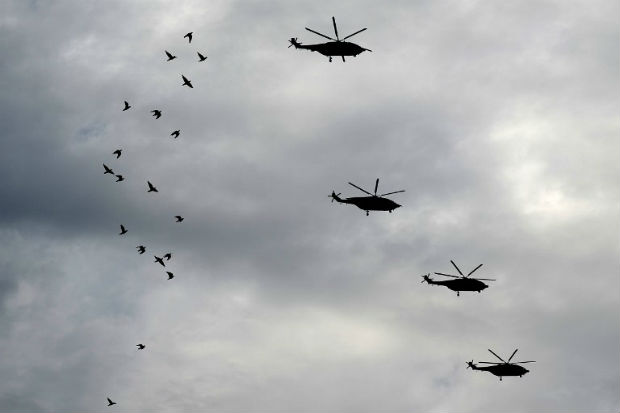
Chinese military helicopters, taking part in a rehearsal ahead of a military parade to mark the 70th anniversary of the end of World War II, fly over a flock of birds, in Beijing on August 23, 2015. China will hold a huge military parade on September 3, which will mark the 70th anniversary of victory over Japanese forces as well as the broader defeat of the Axis powers in World War II. AFP
BEIJING, China — From Belarus to Vanuatu, China on Tuesday issued a list of world leaders attending next week’s huge military parade to mark Japan’s defeat in World War II that was notable for its absences.
The display, a show of strength which comes as Beijing takes a more assertive stance regionally, will see 12,000 soldiers and 500 pieces of hardware roll through Tiananmen Square, with almost 200 aircraft flying overhead.
Chinese officials listed 24 heads of state and government as attending, with Russian President Vladimir Putin, South Korea’s Park Geun-Hye and South Africa’s Jacob Zuma among the most prominent. UN Secretary-General Ban Ki-moon will also go.
Notable among the absentees on the list was North Korean leader Kim Jong-Un, who has yet to visit Beijing despite China being his country’s key diplomatic protector.
Pyongyang was sending politburo member Choe Ryong-Hae, officials said.
“It is up to foreign countries to decide on who to send,” said Zhang Ming, a deputy foreign minister. “As the old Chinese saying goes, ‘anyone who comes is our guest’. We welcome them all.”
Communist China generally shies away from the vast annual demonstrations of military might that were a hallmark of the Soviet Union, normally holding such events once a decade to mark the foundation of the People’s Republic.
It has struggled to attract world-wide interest for the parade as world leaders are wary of the tone of the event, and the risk of lending it legitimacy.
Beijing is becoming increasingly assertive in the region and regularly accuses Tokyo of failing to show sufficient contrition for Japan’s 20th-century invasion of China.
The conflict is officially known in the country as the “Chinese People’s War of Resistance against Japanese Aggression and the World Anti-Fascist War”.
Zhang told reporters: “The commemorations do not target any specific country, not today’s Japan nor the Japanese people in general.”
But neither Japanese Prime Minister Shinzo Abe nor any official representative of Tokyo will go. Former prime minister Tomiichi Murayama — who issued a landmark apology for the war in 1995 — will be present in a personal capacity.
The only European Union head of state or government named as attending was Czech President Milos Zeman.
France and Italy will send their foreign ministers, officials said, but the governments of the US, Germany and Canada will be represented only by their resident ambassadors.
Former British prime minister Tony Blair will attend, but not in an official capacity.
A total of 17 countries are sending troops to take part, including Russia, Cuba, Serbia and Mexico, along with several of China’s neighbors.
Chinese President Xi Jinping attended a similar parade in Moscow in May commemorating victory over Nazi Germany.
Xi and Putin hold frequent summits and their countries, both permanent members of the United Nations Security Council, often take similar stances there on divisive issues such as the conflict in Syria.
China’s Communists were largely an underground force during World War II, with the brunt of the campaign against the Japanese fought by soldiers of the country’s then Nationalist government led by Chiang Kai-Shek.